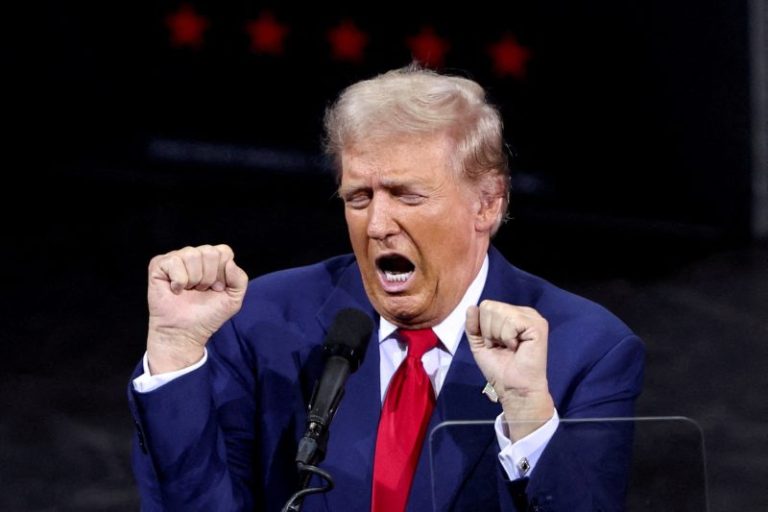Former president Donald Trump pitched yet another idea meant to win over hourly workers that surprised his own advisers: Stop taxing overtime.
“We will end all taxes on overtime. You know what that means?” he said Thursday during a campaign stop in Arizona. “That gives people more of an incentive to work. It gives the companies, it’s a lot easier to get the people. … It would be unbelievable. You’ll get a whole new workforce by doing no taxes on overtime.”
Though no details were provided, the proposal marks the Republican presidential nominee’s latest overture to low- and middle-income voters. Last month, he called on the federal government to carve out similar exemptions on tip earnings and on Social Security payments, regardless of income level.
On Friday, economists questioned how it would work.
“If you did not put any guardrails on this, it would be a huge revenue loser,” said Brendan Duke, senior director for economic policy at the left-leaning Center for American Progress. Such a shift, he said, could lead employers to classify as much of a worker’s wages as overtime as possible. “As long as you’re not violating the federal minimum wage or the state minimum wage, it’s off to the races.”
One of Trump’s economic advisers, Stephen Moore, said the announcement came as a surprise. To his knowledge, he said, the former president has not hammered out any of the details. “This is an idea that Trump came up with himself, just like not taxing tips,” Moore said. “It’s a way to help working-class folks. … If you’re putting in more than 40 hours, you should be rewarded for it and not taxed for it.”
As for how much it would cost, Moore said, “We’re going to start trying to determine that. … I don’t think it would be hugely expensive, but I don’t have a good estimate.”
Such a plan probably would require an act of Congress, and Moore said he believed Trump probably would favor a law in which overtime pay was exempt from income tax but still subject to payroll taxes, so that employees would still pay into Social Security and Medicare based on total wages including overtime pay.
While Trump’s Democratic rival, Vice President Kamala Harris, echoed his call to exempt tips from taxes, a spokesperson for her campaign blasted the no-tax-on-overtime proposal as Trump’s “latest snake oil sales pitch.”
“He is desperate and scrambling and saying whatever it takes to try to trick people into voting for him,” Joseph Costello said in a statement. “If he takes power again, he will only look out for himself and his billionaire buddies and their big corporations.”
The Fair Labor Standards Act lays out detailed rules for workers who must receive overtime pay — many hourly workers are included, while many other workers like executives, teachers, babysitters and some elder-care workers are not. The law goes into great and sometimes unexpected detail — movie theater workers, for instance, are not required to be paid overtime.
Once covered employees exceed 40 hours a week, the law requires their companies to pay them at least 1½ times their normal pay for any further hours they work. Democrats and Republicans have gone back and forth on which workers should qualify for overtime, with Trump favoring overtime guarantees for 4 million fewer workers during his presidency than a plan favored by former president Barack Obama.
Last year, Alabama became the first state to pass legislation exempting overtime wages from state income taxes. The bill was proposed by a Democrat and supported by Republicans, and the reprieve is currently in effect as an 18-month trial that ends next June. Similar measures have been introduced in several other statehouses.
Economists raised concerns that Trump’s proposal might distort how workers report their income. People who are currently salaried could press their employers to reclassify them as hourly workers, for instance. Employers could reduce their workers’ base pay but greatly raise their overtime pay.
“You can game the system here pretty easily,” said Rajesh Nayak, a former assistant secretary for policy at the Labor Department. “CEOs can get a base pay and get most of their pay in overtime, then suddenly they don’t have to pay taxes on that.”
Others wondered why an hourly worker should pay less in taxes than a salaried worker with comparable annual pay.
“Workers making the same income ought to be taxed the same way. It’s true whether it’s tips. It’s true whether it’s overtime. As policy, it fails the equity test. And I have no idea what it’s going to cost, but the cost will not be trivial,” said Howard Gleckman, a senior fellow at the Tax Policy Center. “You’re going to want to maximize your overtime pay because it’s tax-free and minimize your regular pay.”
While experts have not yet run the numbers on the concept of exempting all overtime from taxes, analysts have said that Trump’s no-tax-on-tips idea could cost the government at least $10 billion a year. Exempting Social Security could cost more than 10 times as much and accelerate the depletion of the Social Security Trust Fund.
Trump pitched the newest idea at his rally Thursday as a boon to deserving groups of workers.
“The people who work overtime are among the hardest-working citizens in our country, and for too long, no one in Washington has been looking out for them,” he said to cheers. “They’re police officers, nurses, factory workers, construction workers, truck drivers and machine operators. It’s time for the working man and woman to finally catch a break, and that’s what we’re doing, because this is a good one.”
He sought the crowd’s approval. “If you are an overtime worker, when you’re past 40 hours a week, think of that: Your overtime hours will be tax-free. Okay? Good? You’re going to have it.”

